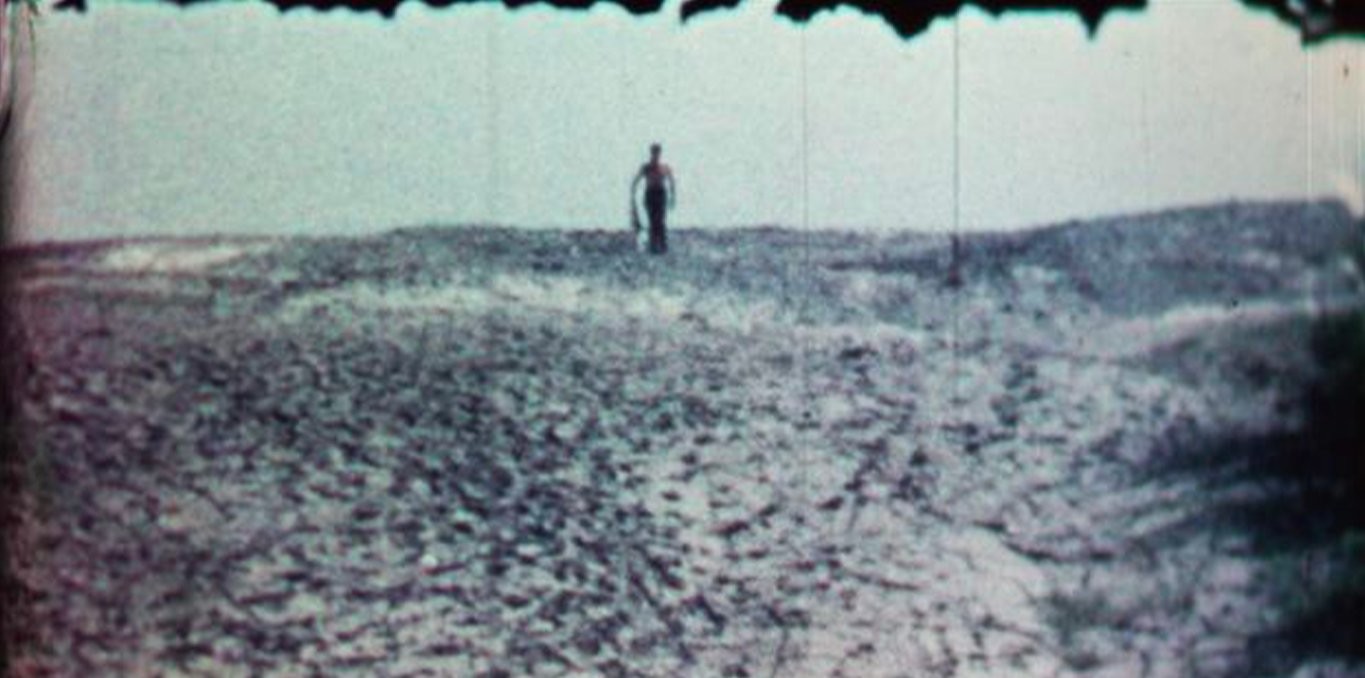Journal afghan

1965: Dimitri and Christine travel across the Near and Middle East by car. They film their journey with an 8mm camera and record a travel journal on a tape recorder. _Journal afghan_ is built from these traces. By replaying them in the chaotic pattern of memory’s persistence, it offers a new experience of travel and an intimate exploration of the mechanisms of memory.
| Director | Cédric Dupire |
| Actor | Jason Burnham |
| Share on |
Journal Afghan by Cédric Dupire was born from a fortunate accident.
After discovering a box filled with anonymous film reels and audio tapes from the 1960s in his aunt’s basement, the filmmaker found himself captivated by this enigmatic and confidential material. This improbable unearthing gave rise to a fascinating film that invites us on a unique journey through revisited archives; a poetic and experimental reinterpretation of a travel journal that delves into the labyrinth of memory and recollection, while questioning our relationship to images and their intended audience.
Emerging from these archives are countless questions and few answers—a sense of glimpsing fragments of life, hearing the voices of ghostly figures speaking to us from another dimension. Who were Christine and Dimitri? Why were they documenting this moment? For whom were their films and recordings intended? This seemingly ordinary journal reveals profound layers of meaning, reflecting both a Western gaze on the «Other» and a desire to capture the ephemeral, to immortalize fleeting moments as a bulwark against oblivion.
Enhanced by a rich musical and sound design, the film masterfully intertwines organic noises and haunting music to create haptic soundscapes. You can almost feel the warmth of the sand, the touch of the wind and the rhythm of the waves on your skin. These elements deepen the immersion, evoking the very essence of travel: a sensory and transformative journey through the world. The fragmented commentary of the two travelers, initially anecdotal, punctuates the ghostly images before morphing into a mesmerizing litany. Eschewing a linear narrative, the editing draws inspiration from the chaos and echoes of memory, crafting mental landscapes where different temporalities coexist. Through this work, Dupire also probes the role of the artist in relation to archives, breathing new life into these materials while preserving their intimate and enigmatic nature.
Journal Afghan is a captivating meditation on time, memory, and how we perceive our own recollections. It invites us to rethink our relationship with history and the ephemeral. Perhaps, in the end, the archives of this couple were meant for us, the viewers, waiting only for Dupire’s gaze and sensitivity to fully reveal themselves to the world.
Jason Burnham
Tënk editorial manager

-

Français
24 mn
Language: Français -

English
24 mn
Language: English
- Année 2015
- Pays France
- Durée 24
- Producteur Studio Shaiprod
- Langue French
- Sous-titres English
- Résumé court A road trip to the Middle East is reimagined through the chaotic echoes of memory.
- Ordre 1
Journal Afghan by Cédric Dupire was born from a fortunate accident.
After discovering a box filled with anonymous film reels and audio tapes from the 1960s in his aunt’s basement, the filmmaker found himself captivated by this enigmatic and confidential material. This improbable unearthing gave rise to a fascinating film that invites us on a unique journey through revisited archives; a poetic and experimental reinterpretation of a travel journal that delves into the labyrinth of memory and recollection, while questioning our relationship to images and their intended audience.
Emerging from these archives are countless questions and few answers—a sense of glimpsing fragments of life, hearing the voices of ghostly figures speaking to us from another dimension. Who were Christine and Dimitri? Why were they documenting this moment? For whom were their films and recordings intended? This seemingly ordinary journal reveals profound layers of meaning, reflecting both a Western gaze on the «Other» and a desire to capture the ephemeral, to immortalize fleeting moments as a bulwark against oblivion.
Enhanced by a rich musical and sound design, the film masterfully intertwines organic noises and haunting music to create haptic soundscapes. You can almost feel the warmth of the sand, the touch of the wind and the rhythm of the waves on your skin. These elements deepen the immersion, evoking the very essence of travel: a sensory and transformative journey through the world. The fragmented commentary of the two travelers, initially anecdotal, punctuates the ghostly images before morphing into a mesmerizing litany. Eschewing a linear narrative, the editing draws inspiration from the chaos and echoes of memory, crafting mental landscapes where different temporalities coexist. Through this work, Dupire also probes the role of the artist in relation to archives, breathing new life into these materials while preserving their intimate and enigmatic nature.
Journal Afghan is a captivating meditation on time, memory, and how we perceive our own recollections. It invites us to rethink our relationship with history and the ephemeral. Perhaps, in the end, the archives of this couple were meant for us, the viewers, waiting only for Dupire’s gaze and sensitivity to fully reveal themselves to the world.
Jason Burnham
Tënk editorial manager
-

Français
Duration: 24 minutesLanguage: Français24 mn -

English
Duration: 24 minutesLanguage: English24 mn
- Année 2015
- Pays France
- Durée 24
- Producteur Studio Shaiprod
- Langue French
- Sous-titres English
- Résumé court A road trip to the Middle East is reimagined through the chaotic echoes of memory.
- Ordre 1
